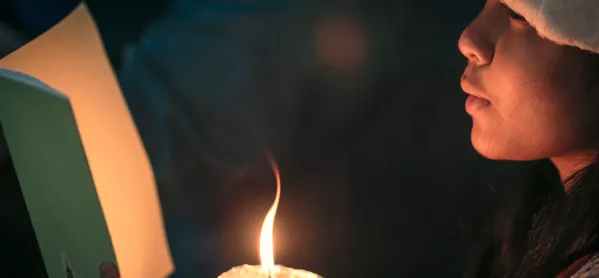Most pupils only know Christmas carols and harvest hymns from singing them at school, according to a former education secretary.
Baroness Morris of Yardley told peers she would not want a society where young people do not know such songs, adding that it gives them a chance to understand the origins of key events.
She made the remarks as peers considered the Education (Assemblies) Bill, which aims to repeal the requirement for daily acts of collective worship in non-faith schools.
Background: Legislation to end compulsory daily worship proposed
DfE: Schools could be ‘investigated’ over daily worship duty
Poll: Most primary schools ‘don’t offer collective worship’
The news comes as survey findings released today by Humanists UK reveal that a majority of parents (65 per cent) are not aware that the collective worship law exists.
The YouGov poll also shows that, once they were informed of the rule, 60 per cent of parents opposed it being enforced.
Former education secretary defends collective worship in schools
Just 24 per cent thought it should be imposed, while a further 12 per cent said they weren’t sure.
Lady Morris, who served as education secretary in Tony Blair’s Labour government between 2001 and 2002, said today that she supports religious education but finds collective worship “bizarre” and the “most difficult to justify” of the links between church and state over education.
She told the House of Lords: “But I do think there are advantages and I do think there are disadvantages, and I think we would lose if we abolished it and that’s why I don’t support [the bill].”
Lady Morris questioned whether schools would assemble children together on a regular basis if the requirement was removed, adding: “I think that cultural heritage, the ceremonies which pepper our lives, are important.
“And although many of us don’t have a faith, most of us choose to go to a ceremony at key points.
“I don’t know the figures, but in terms of baptism and marriage, funerals or whatever, we turn to faith institutions.
“And if we’d never had any experience of worship, of service, of ceremony based on faith, I don’t know how we would cope with turning to those institutions at key points in our life and in the decisions that we make.
“And I think we’ve got cultural experiences and occasions that are also in common.
“Most children would not know about Christmas carols if they didn’t sing them at school.
“And as harvest approaches, one of the reasons we probably all know the hymns of harvest is because we sung them at school.
“I wouldn’t want a society where children didn’t know about Christmas carols because, although Christmas is often not celebrated as a faith occasion in many homes, that is its origin and that is what it means and that’s what it stands for - and children need to learn and understand that so they can make their own decisions.”
